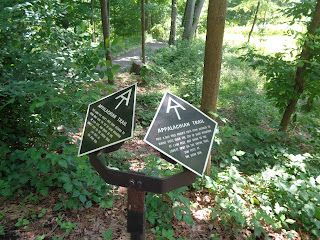At the fork in the road
"When you come to a fork in the road, take it." -Yogi Berra
When do you come upon a fork in the road when you're not physically travelling? When you're on a spiritual journey. And during the period between Rosh Hashana and Yom Kippur all those who fall in between the wholly righteous and the wholly wicked are set upon the crossroads.
Rosh Hashana 16b
When do you come upon a fork in the road when you're not physically travelling? When you're on a spiritual journey. And during the period between Rosh Hashana and Yom Kippur all those who fall in between the wholly righteous and the wholly wicked are set upon the crossroads.
Rosh Hashana 16b
א"ר כרוספדאי א"ר יוחנן שלשה ספרים נפתחין בר"ה אחד של רשעים גמורין ואחד של צדיקים גמורין ואחד של בינוניים צדיקים גמורין נכתבין ונחתמין לאלתר לחיים רשעים גמורין נכתבין ונחתמין לאלתר למיתה בינוניים תלויין ועומדין מר"ה ועד יוה"כ זכו נכתבין לחיים לא זכו נכתבין למיתה
Rabbi Kruspedai said that Rabbi Yoḥanan said: Three books are opened on Rosh HaShana before the Holy One, Blessed be He: One of wholly wicked people, and one of wholly righteous people, and one of middling people whose good and bad deeds are equally balanced. Wholly righteous people are immediately written and sealed for life; wholly wicked people are immediately written and sealed for death; and middling people are left with their judgment suspended from Rosh HaShana until Yom Kippur, their fate remaining undecided. If they merit, through the good deeds and mitzvot that they perform during this period, they are written for life; if they do not so merit, they are written for death.
Many have raised the question: why can't the beinonim simply change their status by doing an additional mitvah and so tip the balance in their favor? Why is teshuva required to proceed to favorable judgement?
With Yogi Berra's advice in mind, I'd answer that what is called for at this particular spiritual juncture is set oneself a direction. While the righteous have their GPS already set to direct them to where they need to go, and the wicked have theirs set on the opposite direction, the third category has no set direction, and this is what needs to be corrected with a return to the set path that teshuva effects.
Of course, most people tend to fall into the in-between category. We may want to be good people and do take steps in the right direction, but sometimes we follow our inclination that takes us off the Torah-true path. That can result in a form of confusion that makes a person less capable of identifying where s/he is in relation to where s/he is supposed to be.
Sometimes alternating between the righteous path and the wrong one can be worse than sticking to the wrong path consistently because you can delude yourself into believing you are still progressing toward the goal. Then you may not even realize which turn is moving your toward the desired destination and which one is taking you away from it.
When we do teshuva, we reorient our spiritual GPS to return to the right path and set out in the direction. The same choice with the reminder which direction will bring which consequence was in the Torah portion that we read right around Rosha Hashana, too.
Devarim 30:19
הַעִידֹ֨תִי בָכֶ֣ם הַיּוֹם֮ אֶת־הַשָּׁמַ֣יִם וְאֶת־הָאָרֶץ֒ הַחַיִּ֤ים וְהַמָּ֙וֶת֙ נָתַ֣תִּי לְפָנֶ֔יךָ הַבְּרָכָ֖ה וְהַקְּלָלָ֑ה וּבָֽחַרְתָּ֙ בַּֽחַיִּ֔ים לְמַ֥עַן תִּחְיֶ֖ה אַתָּ֥ה וְזַרְעֶֽךָ׃
I call heaven and earth to witness against you this day: I have put before you life and death, blessing and curse. Choose life—so you and your offspring will live
Accordingly, Eliyahu at the famous incident of the test at Har Hakarmel takes the Jews to task: (Melachim 1 18:21) כא וַיִּגַּשׁ אֵלִיָּהוּ אֶל-כָּל-הָעָם, וַיֹּאמֶר עַד-מָתַי אַתֶּם פֹּסְחִים עַל-שְׁתֵּי הַסְּעִפִּים-
He then demands that make the choice to either follow Hashem or Ba'al as the Deity worthy of worship. In other word, Eliyahu shows them, "you've arrived at a fork in the road; now take it! You must decide on a path and stick to it!"
\
Gmar Chathima tova!
Like and follow on Facebook https://www.facebook.com/KallahMagazine/
Like and follow on Facebook https://www.facebook.com/KallahMagazine/

Comments